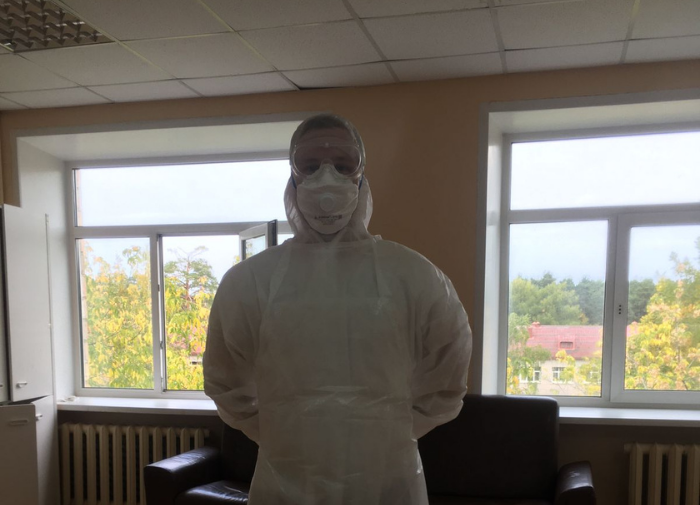
Kirill Zarya is a 6th-year student of the Medicine and Prevention Faculty and he has been working in the «red zone» of Central City Clinical Hospital No. 24 in the therapeutic department since September 2020. The reasons of the student to get a job in the «red zone», in fact, in the epicenter of the fight against coronavirus infection, what is included in his duties and whether it is difficult to combine work with study – more information in our publication below.
“Red Zone”
“In September 2020, I witnessed a staggering increase in morbidity. I heard from friends how hard it is for medical personnel in the “red zones”, and realized that I could no longer stay away. I called the HR department — I already had experience at that time, so I was offered to go to work the very next day, and I did. There I had no fear – and what is there to be afraid of for yourself? But for people who got sick and needed hospital treatment – in this case, yes.
Duties of a ward’s medical brother
My responsibilities include thermometry, pulse oximetry, glycemic profile registration, ECG removal procedure. Filling in the journals: admission, transfer of shifts, bactericidal installations; work with appointment sheets, execution of doctor’s appointments: all types of injections, layout and delivery of tablets; monitoring of oxygen supply, catheterization of the bladder, peripheral vein; installation of a nasogastric probe. In a word, the whole range of competencies of the ward’s medical brother.
Combining work and study
Combining work with study is not difficult for me. Once it was hard in the first few courses, now you no longer notice the difference, since the educational process is fixed by a huge number of real situations in the therapeutic department. In therapy, you can see everything, even surgical pathology. Difficulties have happened on separate study cycles, after all, study is a priority, which some teachers constantly remind me of, and I have never forgotten as well.
Choosing a profession
There were no people with medical education in my family. In high school, I finally decided on the choice of my future profession by enrolling in the medical class of Gymnasium No. 9. Nothing attracted me as much as medicine, this exciting synthesis of scientific knowledge and practical activity, working with people resonated in my soul.
Then I attended pre-university training, and then actually entered the university. During my studies, I have never doubted my desire to graduate from the medical and preventive faculty, and course by course I am only more confident in mastering the profession. With a future specialty, everything is much more complicated, it just so happens that I like everything, no matter how it sounds. Therefore, I tend to the most versatile specialty: therapy (with the possibility to go deeper in one of the directions), intensive care and reanimatology, or general medical practice.”
Daria Korchak